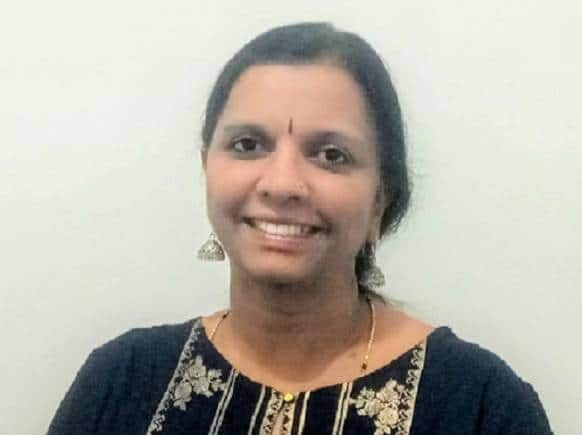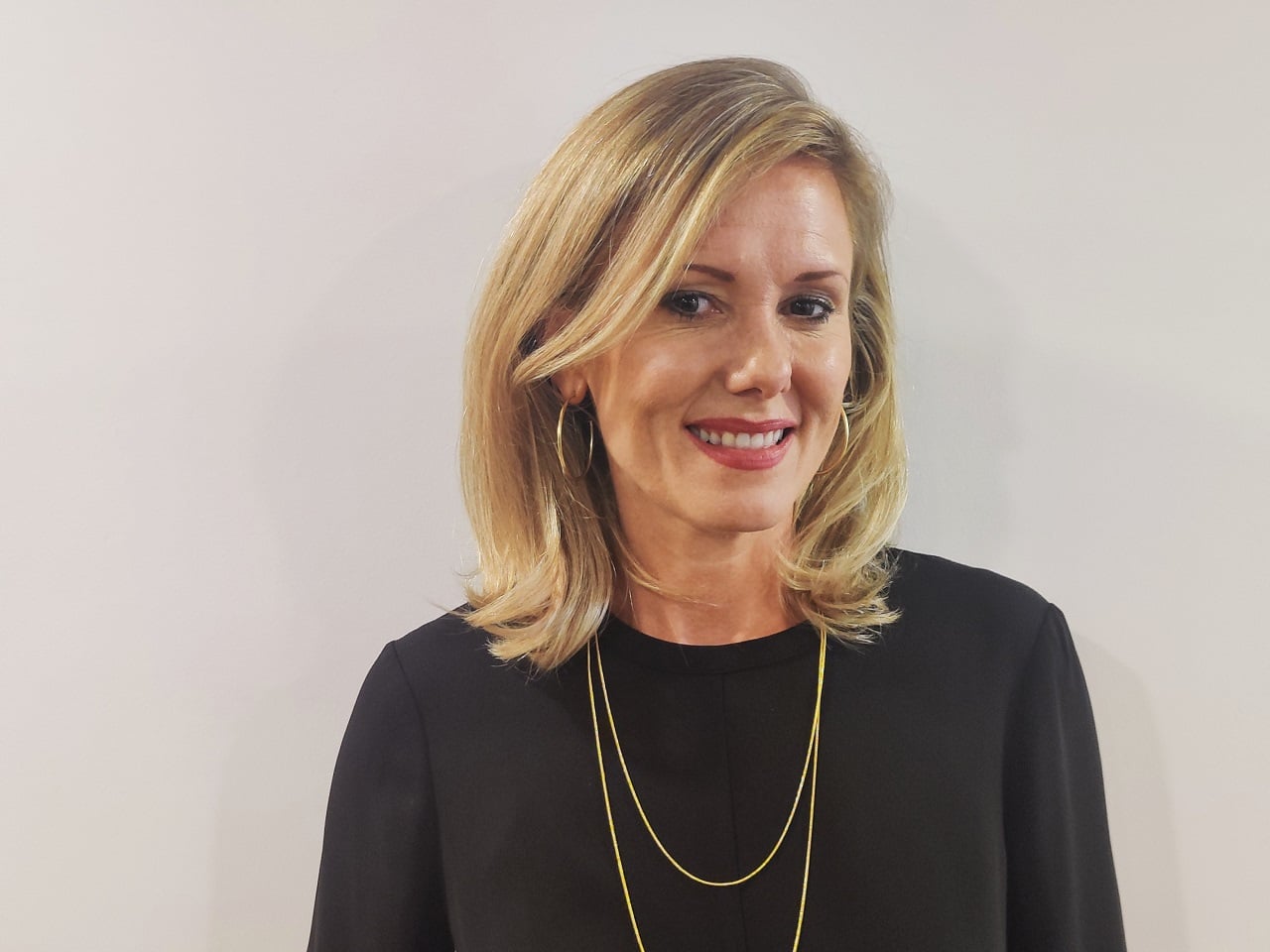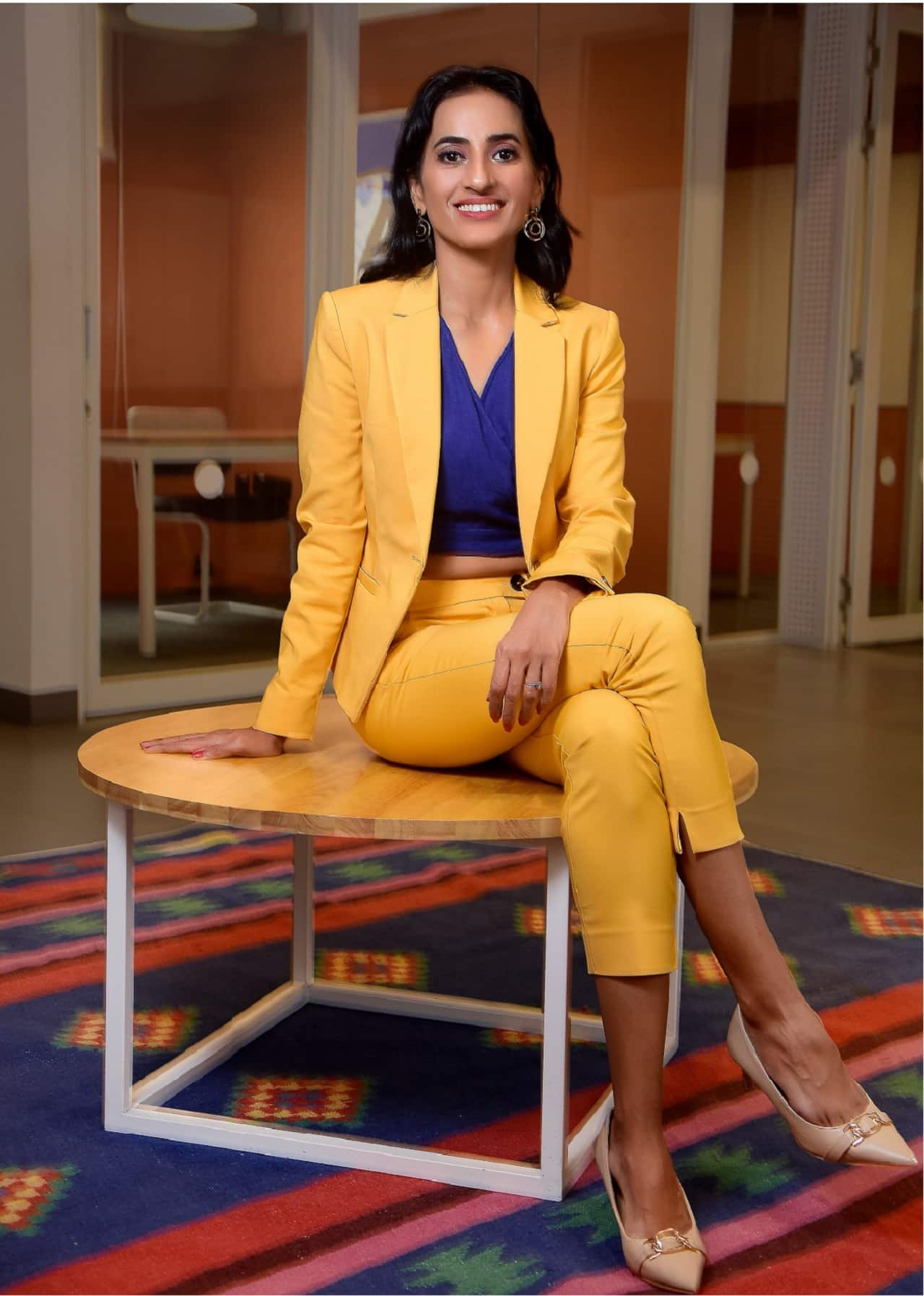


This Women's Day, Moneycontrol brings you a conversation with 3 women entrepreneurs in India who are blazing a trail in 3 very different fields. AI & Health, Fin Tech and Direct to Consumer (DTC).
FeaturingDr. Geetha Manjunath, Founder & CEO, Niramai Health Analytix,
Lizzie Chapman, Co-founder & CEO, ZestMoney and Vineeta Singh, Co-founder & CEO, SUGAR Cosmetics
They spoke with Moneycontrol's Chandra R Srikanth about their journey, key challenges, the opportunities for women entrepreneurs in India today, and why equality at home is as important as equality in the workplace.
Edited excerpts:Moneycontrol: Dr. Geetha, let me start with you, from starting up to running NIRAMAI today, take us through your experience, how difficult or easy for a woman founder to run a start-up in India today?
Dr. Geetha Manjunath
Sure, I'm basically an accidental entrepreneur. I was a technologist or researcher in an international lab, Around that time, one of my cousin's sisters got detected with breast cancer. And I -- at that time really saw what that disease can do to the family and to the whole, extended family. And it's extremely shocking when you lose a simple friend who's been with you all the time. And similarly, another instance happened in the family and I said, okay, as innovators and technologists, like, why are we solving some global problem, like in the U.S. or Europe, when there's this huge issue that is right in front of us.
So that is, when I quit my job and started this four years ago, it's been great learning I would say, every day, to say the least. It's been a long journey of technical validation, product validation, product-market fit, and also figuring out what pricing needs to be done. We now have this installed in 70, plus hospitals in 15 cities of India, with more than 33,000 women who have gone through this test, and also a lot of international clearances as well.
Moneycontrol: Lizzie, you chose to adopt India and grow your startup here. If you had to go back and do it all over again, would you still choose Bengaluru? Would you choose London? What would you do differently?
Lizzie Chapman
And I hope India's adopted me.
Moneycontrol: We have.
Lizzie ChapmanThank you, I would absolutely do it all again, and probably do it again, with even more passion. I'm just so grateful for the opportunity set that this country has provided over the last five years. It's been absolutely in excess of what we could have ever imagined. And I'm not just talking about the digital journey, and the incredible emerging of this demanding consumer that we are seeing in this country. And we are excited to serve. But I'm also talking about the ecosystem. I hope this panel here today shows what can be achieved. And even for women who looked like me and might not look like the norm and might be a bit of an outsider. The fact that we've managed to achieve what we have in a relatively short space of time, I think really proves what a supportive ecosystem we have now built in this country today.
Moneycontrol: Would you agree with that Vineeta? Is there more acceptance and a better network that you have today?
Vineeta Singh
Right. So hi, firstly, very excited to be on the super inspiring panel. And I think as Dr. Geetha said, She's an accidental entrepreneur, I think if I were to describe myself in two words, it would be a struggling entrepreneur. It's been a long journey. We wanted to create a new age beauty brand for young millennials, we thought that there was a big opportunity to create a brand for younger women. And in the last five years, as it turns out, the adoption of e-commerce, the real prevalence of social media has made it easier for brands that stand for very good products to actually be more accessible. So now we're available in more than 10,000 retail points as well as online, and we have a net revenue run rate of about 200 crores.
So when I look, think about it, I think today is like a great time to be an entrepreneur, the ecosystem has really evolved. And especially for women. So, when I look back, when I look back at like seven to eight years ago, the situation that was compared to today, I think some of the things that we're really grateful for is that, there aren't people think about before saying things like we don't invest in women entrepreneurs, because, their priorities change their ambitions change when they decide to have kids. So about seven to eight years back, there was a lot of, covert sexism as well as some level of harassment when you were dealing with clients. I think there's a lot more awareness around that.
So I think definitely in terms of, the conversation in the ecosystem, the support that VC funds are now giving to women entrepreneurs by having cohorts that are dedicated to them. And trying to increase the number of women both as VCs and in companies that are being funded, I think it is a much better time. Just hoping for the funding numbers, the amount of funding that comes to women to increase and I hope it's going to happen in the next seven to eight years.
Moneycontrol: Right. Vineeta, I'm wondering if your experience as a marathoner has really helped you sustain the struggle because it has been like running a marathon for you over 10 years before you finally saw some validation
Vineeta SinghYeah, I'm a marathoner, Lizzie is an even faster marathoner. So you have a lot of marathoners on this panel. And I have to say that you know marathons, is the biggest taboo word is this thing called DNS, which is Did Not Finish. So we're very scared of quitting like no matter, even if you are dying, you are crawling to the finish line. We are so scared of quitting that even if the company is not going anywhere, I would rather pivot and shut it down.
Moneycontrol: So Dr. Geetha, Lizzie, again, in terms of funding, has it changed? Do you still counter very unusual questions for women founders? Is that element of bias still there?
Dr. Geetha ManjunathYeah, so, like mentioned, I think, the investors are more friendly today to both women. Whereas, of course, there are some tough questions, there are some small unsaid things, I guess, right. For example, because we were going on this big, big challenge of trying to change the way cancer is detected and cancer. So the amount of confidence that investors have on the founders, now to, in the confidence that the founders will beat the challenge or whatever, right. So that level, I guess, was varying between one investor to another. But apart from that, I didn't find any discrimination between male or female founders or whatever. Also, we were like, two female founders. So it was like, the better aspect of it.
Moneycontrol: Lizzie you want to talk out your own experience?
Lizzie ChapmanI want to echo exactly what Vineeta said. I think what has happened is that explicit bias may have become more subtle, right. So we don't face it in meetings. But I think we all know from looking at the data. And I don't mean just the data in terms of who gets funded in terms of gender ratio, but just look at who's making the decisions, right? There are still far, far fewer women in positions of decision-making. And that will take a long time to structurally change.
I think the good news is, in the last couple of years, we have certainly seen, much, much lesser of any of that obvious, explicit bias. And most importantly, and I think Vineeta proves this really well as well. The numbers start to speak for themselves as you scale up. So I think it's a challenge in the early days when you need that buy-in. And we had a huge challenge because we were two women trying to tackle a problem in one of the most masculine domains, right? We were trying to build a lending business, we would need collections teams. And I do remember on day one, the first investor we pitched said, how will you manage men in India, which I took to be a very offensive and racist question.
But basically, what we then went out and did prove it with data and execution, right. So we built a great team, we had fantastic results. And now honestly, the data and the quality of our team speak for themselves. So touchwood, we have never had any challenges when it comes to sort of gender bias. But I do think it's a topic we need to talk about more. And all of us women here need to be more vocal, more present and act as role models. Not just to inspire young women, but to make investors comfortable, that we're doing a good job, and to create role models and an ecosystem.
Moneycontrol: Vineeta, was it helpful having a male co-founder, I mean, he also happened to be your husband, but did that kind of help in battling some of this perception or bias that invariably tends to creep in during some of these conversations?
Vineeta SinghYeah. So definitely, I've had it easier than, these two sets of two women co-founders that Geeta, Dr. Geetha, and Lizzie, bring to the table. It's definitely easier. In fact, I remember back in 2012, '13, I had like, there was an angel investor who mentioned that it makes sense for us to put in the money only if we know that Kaushik is going to be coming in full time because I started it while Kaushik was still working at McKinsey.
But having said that, there was a bias against a couple of founders, because of the fact that the same logic that you have that you don't, like, women won't be able to build large teams, because 45-year-old men won't be okay with reporting to women, especially if they're younger than them or in disease case, they're not the same race.
There was also this reaction that as couples have, it would like, seem like this family business, and, it will be harder for you to build large teams with respect to, because you wouldn't be considered as two professional individuals, but a couple that is leading the company.
Moneycontrol: Lizzie, in terms of the post-pandemic world, the post-COVID world, has leveled the playing field to some extent for women, because, you can do fundraising meetings over Zoom or you can have women work anywhere in the world because of remote workplaces. Do you think that could perhaps be an advantage?
Lizzie ChapmanI think it's complicated. It's a double-edged sword, right. So I think what you're seeing at the moment, is a lot of women saying, we always told you that work could be more flexible. And finally, just because men have to experience that, right, they're sort of jumping on the bandwagon. So without, being too silly about it, it's great that we've moved towards more flexibility, more awareness, and that's the good piece.
The negative piece, and honestly, we're seeing it even in our own team, is that when women work from home, they have a very different experience of men working from home. And I think this is where we all need to work more constructively to break stereotypes, not just in the workplace. And I say this all the time, equality in the workplace begins when we get more equality in the home. And unfortunately, a lot of working women at the moment are working harder than they ever have to juggle the requirements of the home with their day job, and their families are not necessarily seeing that division that they see more naturally with men. And it's up to us as employers, and again, as kind of role model women in the space to create that division.
One thing I train the women in my team on is just talking about your work around the dinner table with your family, make it something that's so important to you and make it something that is a passionate commitment from the whole family. And then they'll start to respect that that time is really precious to you. But I'm definitely thinking it's a little bit more complicated than just to say, yeah, remote work is good for women, not so clear.
Moneycontrol: But Dr. Geetha coming to you, you know, you spoke about your own entrepreneurship journey, how you started up to solve a problem that you saw very close up? But do you think entrepreneurship can also be a means to sort of closing the pay gap and bringing change.
Dr. Geetha ManjunathSo, I completely agree with you that entrepreneurship doesn't always have to start with your own experience or experience around it. But typically what happens is, if the entrepreneur sees a gap and really feels for it, passionately wants to solve it, right? And that is where that's not the best buck would be right. So essentially, figuring out a problem that is so critical for society or for yourself to solve it, right. And then going after it with complete perseverance is what I found. Many people do and do well. And that is what keeps you going because there are lots of ups and downs and marathon aspects that were mentioned before. So for all of this, you need to be believing that at the problem request solution and that you are able to get to that right. And you could obviously change the society by doing going to doing that kind of a thing.
Moneycontrol: Vineeta. In terms of the leadership style, that women have to bring as a founder, as an entrepreneur, there are some people who feel that they have to play to their natural instincts- bring empathy, bring compassion. So what is your own take on that? Or you know if it's very subjective, again it depends on each entrepreneur.
Vineeta SinghI think the beautiful thing that I've seen in not just our organization, but a lot of other women-led organizations is that this whole, like, the alpha culture of being like, very aggressive during meetings and free-flowing language and a lot of pressure isn't there. And, for targets, which is where people scream at each other, et cetera. Because people are more restrained, and there is genuinely like this fear that, when you cross the line, there might be -- you get might get pulled up by HR. I think it the -- what is led to is that overall, the culture is just of more camaraderie, more empathy. And I think one of the things women that we're able to do, one of the biggest reasons why people quit small organizations is they don't understand expectation setting, and they don't understand where the company is going, the mission of the company.
I think women leaders by nature what I've seen is over-communicate. They have more conversations with the team members about what's not going right, what's going right, rather than having to put up this brave face, which is a lot of male entrepreneurs are compelled to do. And what that -- that makes us vulnerable, but that also helps the organization stay in touch with what's going on.
Moneycontrol: I'm going to end by asking each one of you to perhaps share one message for aspiring women entrepreneurs, women leaders who may be watching you or reading this on March 8th
Lizzie ChapmanI would say the most important quality to be a female entrepreneur is authenticity. To get the best out of your team, they must trust you. Same with your investors, same with your business partners. And the only way to build trusted relationships, I believe, is to be really genuine and really authentic. So just be yourself, believe in your passionate mission, and go out there and get it done.
Dr. Geetha ManjunathBelieve in what you want to solve, keep the passion going, you will find ways of solving it. Don't lose confidence, don't lose faith in yourself, you can do it. In fact, women are better in multitasking. Actually, women can be better entrepreneurs.
Vineeta SinghYes. I just like to add on ask for help like Lizzie mentioned. We all need help at home. And sometimes we just feel it's our duty to do more, but, sometimes just asking for help and at work as well. I think one of the biggest differences where, because of which needs to pay gap is that women don't ask for support as well as don't ask for like a pay raise.
I would say ask for help. Ask for what you dissolve and speak up. And we're definitely going to be unstoppable.
Discover the latest Business News, Sensex, and Nifty updates. Obtain Personal Finance insights, tax queries, and expert opinions on Moneycontrol or download the Moneycontrol App to stay updated!